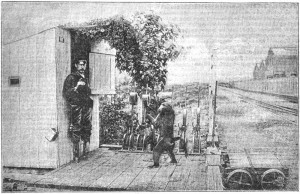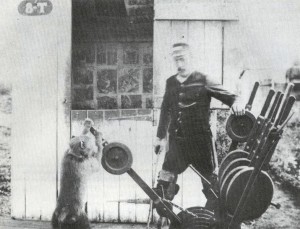After losing his feet in an accident in the 1880s, South Africa railway worker James “Jumper” Wide found an unlikely friend in a baboon named Jack. In this week’s episode of the Futility Closet podcast we’ll learn how Jumper taught Jack to work as a signalman on the railway line, where he won the trust of both authorities and passengers.
We’ll also meet an Englishman who dreamed the winners of horse races, ponder the strange case of the Stringfellow Acid Pits, and present the next Futility Closet Challenge.
Our post about Jack the monkey signalman appeared on Nov. 14, 2005. Sources for that segment:
George B. Howe, “A Unique Signalman,” The Railway Signal, September 1890.
Chris Marais and Julienne Du Toit, Shorelines: A Journey Along the South African Coast, 2006.
Roger Webster, At the Fireside: True South African Stories, Volume 3, 2005.
Associated Press, “Jack, the Amazing Baboon, Gets a Correction, 100 Years Later,” Telegraph, Nov. 11, 1990. (This refers to a correction that appeared that year in Nature. Reportedly an article in the journal’s July 24, 1890, issue had indicated that Jack worked in Natal, not Uitenhage. I don’t think the reference is accurate — that would have been vol. 42, no. 1082, of Nature, and I don’t find the report in that issue.)
Dorothy L. Cheney and Robert M. Seyfarth, Baboon Metaphysics: The Evolution of a Social Mind, 2008.
Our post on John Godley, who dreamed the winners of horse races, ran on April 29, 2010. He tells the whole tale in Chapter 3 of his memoir Living Like a Lord, which was originally published in 1952.
In 2009 the Examiner recounted Godley’s experiences (including his big win at the 1958 Grand National), as well as those of others who have had premonitory dreams of racetrack winners.
“Toxic Dreams,” Jack Hitt’s article about the victims of chemical dumping at California’s Stringfellow Acid Pits in the 1970s, appeared in Harper’s in 1995. It’s since been collected in Ira Glass’ 2007 book The New Kings of Nonfiction. (Thanks, Andrew.)
You can listen using the player above, download this episode directly, or subscribe on iTunes or via the RSS feed at http://feedpress.me/futilitycloset. The show notes are on the blog, where you can also enter your submissions in this week’s Challenge. Many thanks to Doug Ross for the music in this episode.
Next week we plan to tell the story of lighthouse keeper Ida Lewis, “the bravest woman in America,” who saved 18 lives in a series of daring rescues off the coast of Rhode Island in the late 19th century. If you have any questions or comments you can reach us at podcast@futilitycloset.com. Thanks for listening!


